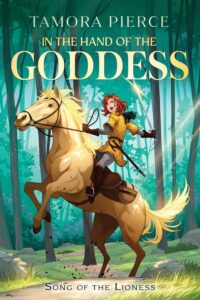Why does epic fantasy have to be so epic …
I love epic fantasy books. Battles, magic, nasty villains, noble heroes. One of the best summers of my life was when I discovered this genre and devoured books by the likes of David Eddings, Terry Brooks, and Robert Jordan. Reading these adventures made me want to write my own epic fantasy books.
But lately, I’ve been wondering something — why do epic fantasy books have to be so, well, epic?
Seriously, have you seen The Gathering Storm, the latest book in the Wheel of Time series by the late Robert Jordan and Brandon Sanderson? It’s 784 pages long and 2.6 inches thick, according to Amazon. You’d have to start lifting weights just to have the arm and wrist strength to hold that sucker in your lap for any length of time. And I don’t even want to imagine how many clicks or scrolls that it would take to get through an e-book version of it. Thousands, probably.
I used to love the Wheel of Times series. I read the first several books during the course of that magical summer that I mentioned above and eagerly awaited the next installments. But as the years progressed, I started to like the books less and less. Why? Because they were so epic — not in the story that they told but in the hundreds and hundreds of pages that it took to get from the beginning to the end of each book. Everything was described in vivid detail in each book, but I began to feel like not much was actually happening, as far as the action and story arcs went.
Maybe it’s me, but as I’ve gotten older, I just don’t have the patience or the desire anymore to read pages and pages of world building that do absolutely nothing to move the story along. And I’m not just talking about Robert Jordan here. Lots of fantasy authors are guilty of this, although it seems to happen more in epic fantasy books than in say, urban or young adult fantasy.
Why? I think it’s because world building is such a big part of what epic fantasy is all about. Readers of the genre expect to be transported to another world full of magic, swords, sorcery, creatures, court intrigue, mythology, demons, or whatever populates an author’s world. It takes time and space to build an intricate world, explain the rules, and fully immerse the reader in the wonder and adventure of it all.
But when did folks get so long-winded about it?
Sure, you may have a cast of thousands in your epic fantasy book a la Robert Jordan, but do you really have to tell me every single thing about their appearance, clothes, customs, religion, money, and politics? With no dialogue or action to break up the descriptions? There’s a fine line between world building and info dumps. Sadly, for me, that’s what a lot of epic fantasies have turned into.
This is why I like books by the likes of Alex Bledsoe, Lisa Shearin, and Scott Lynch so much. Each one of these authors offers the epic fantasy reading experience, but without going overboard on their world building. And they’re doing some different things in the genre too. Bledsoe combines fantasy with a world-weary, film noir-type detective. Shearin is writing female-focused epic fantasy. Lynch incorporates elaborate heists into his books.
They all help me remember why I fell in love with epic fantasy books in the first place, and I hope to find more authors to read like them, folks who can tell a good story and not get bogged down in the details.
What about you guys? Are you still digging epic fantasy? Why or why not? What are some of your favorite books in the genre? Share in the comments.

I recently tried to re-read the first novel in J.V. Jones’s second epic series. (The one after the Baker’s Boy trilogy — I forget the name.) I was wondering why it was moving so slowly for me when I got to this scene where this villain is climbing down a long set of stairs.
It’s an interesting set of stairs, because it goes from a tower down into the bowels of the earth. But the scene went on for pages and pages and pages as the guy thought his evil thoughts. Where was the J. V. Jones who wrote The Barbed Coil, one of my favorites of all time? Not in that book.
Recently, I’ve enjoyed Liane Merciel’s The River Kings’ Road, Peter Brett’s The Warded Man and David Anthony Durham’s Acacia trilogy. Oh! and The Name of the Wind by Patrick Rothfuss.
I’ve never heard of Jones before, but that’s exactly what I mean. All those pages just for a staircase, yikes!
Warded Man is another one that I’ve been meaning to pick up since I saw it on your blog a while back. 😉
I think the publishers and writers have decided that they want to give the readers their money’s worth, and the best way to do that is with lots and lots of books that can also serve as doorstops.
Heh. I don’t know about that. You’d think publishers would encourage even epic fantasy authors to write shorter to save paper/money these days.